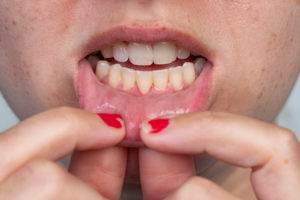
When it comes to oral health, most people think about their teeth first. However, your gums also play an important role in maintaining a healthy smile. Not only does gum tissue support teeth and keep them in place, but it also acts like a seal that protects tooth roots from harmful bacteria. If you don’t take good care of your gums, however, they can begin to recede. Do receded gums grow back? Keep reading to discover more about gum recession and what steps you can take to prevent it.
What Is Gum Recession?
Gum recession is a condition where the gum tissue pulls away from the teeth, exposing the roots underneath. Receding gums increase the risk of cavities, cause tooth sensitivity, and can make teeth appear longer than normal. According to the Cleveland Clinic, approximately 88% of people over the age of 65 have gum recession on one or more teeth. However, while gum recession is most common in people over 65, it can affect people of all ages.
Common causes of receding gums include:
- Periodontal disease
- Aggressive brushing or flossing
- Bruxism (teeth grinding or clenching)
- Tobacco use
- Facial trauma
- Age
- Poorly aligned teeth or a misaligned bite
Will Gums Grow Back After Receding?
No matter what is causing your gums to recede, once they pull away from teeth your gum tissue will never grow back. That is why it’s so important to prevent gum recession from happening in the first place. If your gums have already drastically receded, you may need a gum graft procedure to restore your appearance and oral health. Gum grafting involves taking soft tissue from another part of your mouth and stitching it over the exposed tooth roots. While effective, gum grafts take time to complete and can be expensive and uncomfortable.
How to Prevent Gum Disease
Periodontal disease, also called gum disease, is the most common cause of receding gums. If caught in its early stage, known as gingivitis, the symptoms of gum disease can typically be reversed. However, if left unchecked, gum disease becomes irreversible and your gums may recede without any chance of growing back.
Fortunately, preventing gum disease is often as simple as brushing twice a day and flossing daily. Just remember to always use a soft-bristled toothbrush and do not press too hard, as aggressive brushing can also cause gum recession.
In addition to practicing excellent oral hygiene at home, be sure to visit a dentist every six months for a professional cleaning and exam. Regular dental checkups give your dentist the opportunity to spot the early warning signs of gum disease and receding gums before it’s too late to take action.
About the Author
Dr. Erin M. Prach provides comprehensive dentistry in a friendly, welcoming environment in Casper, WY. The proud University of Colorado graduate loves using her skills and expertise to help patients regain confidence in their oral health. To learn more about how to prevent your gums from permanently receding, visit Dr. Prach’s website or call 307-337-4770.
